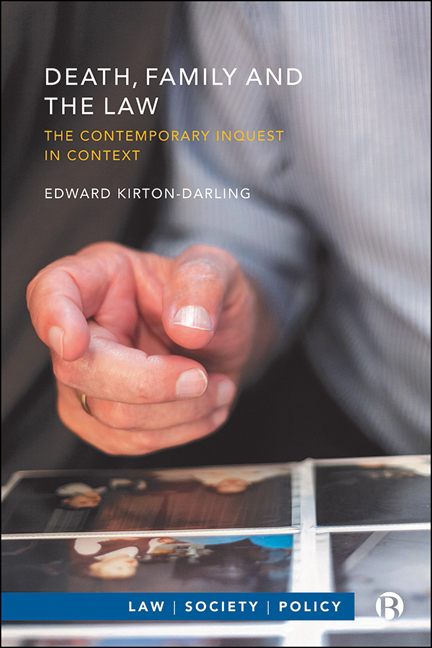Book contents
- Frontmatter
- Contents
- Acknowledgements
- Series Editor’s Preface
- 1 Death, Family and the Law
- 2 Accountability and Authority in the Historical Jurisdiction
- 3 Accountability Reconceived
- 4 First Contact and the Next of Kin
- 5 Dignity, the Family and the Body
- 6 Family in the Driving Seat
- 7 The Public(?) Hearing
- 8 Reimagining the Inquest
- Bibliography
- Index
5 - Dignity, the Family and the Body
Published online by Cambridge University Press: 08 October 2022
- Frontmatter
- Contents
- Acknowledgements
- Series Editor’s Preface
- 1 Death, Family and the Law
- 2 Accountability and Authority in the Historical Jurisdiction
- 3 Accountability Reconceived
- 4 First Contact and the Next of Kin
- 5 Dignity, the Family and the Body
- 6 Family in the Driving Seat
- 7 The Public(?) Hearing
- 8 Reimagining the Inquest
- Bibliography
- Index
Summary
Introduction
The body implies mortality, vulnerability, agency: the skin and the flesh expose us to the gaze of others, but also to touch, and to violence, and bodies put us at risk of becoming the agency and instrument of all these as well. Although we struggle for rights over our own bodies, the very bodies for which we struggle are not quite ever only our own. The body has invariably public dimensions. (Butler 2006, 26)
Those public dimensions and struggles over rights do not end when life ends. After a sudden death, the body is both the remains of the person who was and vital evidence for the investigation into how they died. What should be done with and to the body is an early and potentially very contentious issue in an inquest, and the way in which the body is treated can be the cause of significant distress for bereaved kin. Specific decisions will often need to be made about the need for a post-mortem and what form this should take, whether further tests are required which involve removing samples from the body, and who the body should be released to when investigations are completed. Such decisions may not be straightforward in many cases and can be a particular source of contestation where the perceived requirements of the investigation clash with religious or cultural responses to the body.
This chapter focuses on decisions around the body and, in particular, on the ways in which the inquest system understands the relationship of the family and the body of the deceased. Central in that are competing framings of dignity, and the coverage here begins by exploring two competing ways to understand dignity in this context. This discussion initially examines the exhumation of bodies, but then turns to apply these two approaches to dignity to the inquest in order to suggest that approaches to dignity can be either framed through a concern with formality, office and civility or through a concern with morality and conscience. This latter understanding emphasises paying attention to care, humanity and kinship, with attention to dignity.
- Type
- Chapter
- Information
- Death, Family and the LawThe Contemporary Inquest in Context, pp. 99 - 121Publisher: Bristol University PressPrint publication year: 2022



